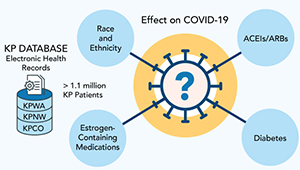Susan Shortreed, PhD
Biography
Susan Shortreed, PhD, uses statistics and machine learning methods to address health science problems, with a special emphasis on analyzing complex longitudinal data. She develops and evaluates statistical approaches for observational data, and works to improve the design and analyses of studies that use data collected from electronic health care records. She is leading a project to develop statistical methods for constructing personalized treatment strategies using data captured from electronic health records.
Dr. Shortreed earned her PhD in statistics from the University of Washington. Then she spent two years in the Department of Epidemiology and Preventive Medicine at Monash University in Melbourne, Australia, and two years in the School of Computer Science at McGill University in Montreal, Canada. Dr. Shortreed has collaborated with scientists in a broad range of areas including alcohol use, cancer screening, and medication safety. She now works alongside researchers in mental and behavioral health, evaluating and comparing treatments for chronic pain and depression, and interventions to prevent suicide. Dr. Shortreed is an investigator with the Mental Health Research Network, designing studies to address important public health concerns, such as determining which antidepressant medications work best for which patients and developing risk prediction algorithms to identify individuals who may be at increased risk for suicidal behavior.
Dr. Shortreed is also an affiliate professor of biostatistics at the University of Washington School of Public Health. She served on the executive board for the American Statistical Association’s Section on Statistics in Epidemiology and the editorial board of the Journal of the Royal Statistical Society, Series C: Applied Statistics.
Research interests and experience
-
Biostatistics
Design and analysis of studies that use data collected from electronic health records; analysis of complex longitudinal data; methods for constructing personalized treatment strategies, computational statistics and algorithms; machine learning; variable selection methods.
Medication Use & Patient Safety
Biostatistics; machine learning; using data collected from electronic health records to study rare adverse events; opioid safety; medication safety in pregnancy.
-
Mental Health
Biostatistics; treatment for chronic depression; suicide prevention; developing personalized treatment strategies; developing risk prediction models.
Recent publications
Coulombe J, Moodie EE, Shortreed SM, Renoux C. Estimating individualized treatment rules in longitudinal studies with covariate-driven observation times. Stat Methods Med Res. 2023 May;32(5):868-884. doi: 10.1177/09622802231158733. Epub 2023 Mar 16. PubMed
Floyd JS, Walker RL, Kuntz JL, Shortreed SM, Fortmann SP, Bayliss EA, Harrington LB, Fuller S, Albertson-Junkans LH, Powers JD, Lee MH, Temposky LA, Dublin S. Association between diabetes severity and risks of COVID-19 infection and outcomes. J Gen Intern Med.2023 May;38(6):1484-1492. doi: 10.1007/s11606-023-08076-9. Epub 2023 Feb 16. PubMed
Coley RY, Liao Q, Simon N, Shortreed SM. Empirical evaluation of internal validation methods for prediction in large-scale clinical data with rare-event outcomes: A case study in suicide risk prediction. BMC Med Res Methodol. 2023 Feb 1;23(1):33. doi: 10.1186/s12874-023-01844-5. PubMed
Cruz M, Shortreed SM, Richards JE, Coley RY, Yarborough BJ, Walker RL, Johnson E, Ahmedani BK, Rossom R, Coleman KJ, Boggs JM, Beck AL, Simon GE. Machine learning prediction of suicide risk does not identify patients without traditional risk factors. J Clin Psychiatry. 2022 Aug 31;83(5):21m14178. doi: 10.4088/JCP.21m14178. PubMed
Simon GE, Shortreed SM, Boggs JM, Clarke GN, Rossom RC, Richards JE, Beck A, Ahmedani BK, Coleman KJ, Bhakta B, Stewart CC, Sterling S, Schoenbaum M, Coley RY, Stone M, Mosholder AD, Yaseen ZS. Accuracy of ICD-10-CM encounter diagnoses from health records for identifying self-harm events. J Am Med Inform Assoc. 2022 Aug 26:ocac144. doi: 10.1093/jamia/ocac144. [Epub ahead of print]. PubMed
Dublin S, Idu A, Avalos LA, Cheetham TC, Easterling TR, Chen L, Holt VL, Nance N, Bider-Canfield Z, Neugebauer RS, Reynolds K, Badon SE, Shortreed SM. Maternal and neonatal outcomes of antihypertensive treatment in pregnancy: a retrospective cohort study. PLoS One. 2022 May 16;17(5):e0268284. doi: 10.1371/journal.pone.0268284. eCollection 2022. PubMed
Moodie EEM, Coulombe J, Danieli C, Renoux C, Shortreed SM. Privacy-preserving estimation of an optimal individualized treatment rule: a case study in maximizing time to severe depression-related outcomes. Lifetime Data Anal. 2022 Jul;28(3):512-542. doi: 10.1007/s10985-022-09554-8. Epub 2022 May 2. PubMed
Wu J, Galanter N, Shortreed SM, Moodie EEM. Ranking tailoring variables for constructing individualized treatment rules: An application to schizophrenia. J R Stat Soc Series C. 71(2):309-330. https://doi.org/10.1111/rssc.12533.
Simon GE, Shortreed SM, Rossom RC, Beck A, Clarke GN, Whiteside U, Richards JE, Penfold RB, Boggs JM, Smith J. Effect of offering care management or online dialectical behavior therapy skills training vs usual care on self-harm among adult outpatients with suicidal ideation: a randomized clinical trial. JAMA. 2022;327(7):630-638. doi: 10.1001/jama.2022.0423. PubMed
Walker RL, Shortreed SM, Ziebell RA, Johnson E, Boggs JM, Lynch FL, Daida YG, Ahmedani BK, Rossom R, Coleman KJ, Simon GE. Evaluation of electronic health record-based suicide risk prediction models on contemporary data. Appl Clin Inform. 2021;12(4):778-787. doi: 10.1055/s-0041-1733908. Epub 2021 Aug 18. PubMed
Research

New findings on treating hypertension in pregnancy
A study led by Dr. Sascha Dublin finds similar outcomes for 3 hypertension medications, filling an evidence gap.
COVID-19

Greater infection risks linked to COVID-19 disparities
New work by Susan Shortreed, PhD, finds infection risks drive worse outcomes for some racial and ethnic groups.
Drugs, diabetes, disparities

Studying COVID-19 risk and outcomes
Dr. Sascha Dublin tells how studies of KP electronic health record data can improve COVID-19 treatment and prevention.
news

Mentorship awards go to Jane Anau and Dr. Jessica Chubak
The honor underscores the institute’s commitment to a work environment that fosters employees’ growth.
KPWHRI IN THE MEDIA
Simpler models for predicting suicide risk work comparably to more complex ones
Q&A: Simple machine learning model predicts suicide risk well
Healio Psychiatry, April 12, 2023



